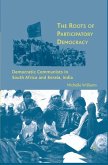'Jessica Piombo offers an innovative and provocative explanation for why post-apartheid South Africa has avoided the siren song of ethnic politics that so many scholars predicted would emerge to dominate its new democracy. Rather than any shifts in the social identifies of its citizens, the incentives implied in its new political institutions have (perhaps unwittingly) led its major political parties to de-emphasize the activation of ethnic identities or the courting of regional minorities, and concentrate instead on the pursuit of national power through broad-based campaign appeals. The irony, however, is that these same institutions also work to insulate the countries elected leaders from day to day citizen influence. Piombo thus offers a new, theoretically rooted perspective on a fundamental conundrum of South Africa's emerging democracy.' - Robert Mattes, Professor of Political Studies at the University of Cape Town and Director of the Centre for Social Science Research
Bitte wählen Sie Ihr Anliegen aus.
Rechnungen
Retourenschein anfordern
Bestellstatus
Storno








